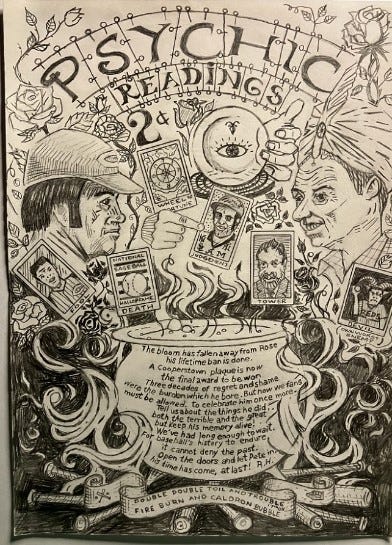One of the more interesting events in my life was spending some time in Pete Rose’s orbit at a fantasy baseball camp in Florida back in early 2002. It was originally scheduled for the fall of 2001, but then 9/11 happened and everything got put on hold for a few months and schedules were rearranged accordingly. It seems like such a long time ago now.
Taking batting practice under Rose’s watchful eye, as I did on the first night of the camp, was a surreal experience. I was never a very good hitter to begin with, but when he barked out “keep your elbow up” you better believe I did exactly that. And I made better contact once I did, too. The man didn’t get 4,256 hits for nothing, after all.
One of the truisms that I picked up from Rose at the camp, just before we started to play competitive games against the other campers, was that “The burgers taste better when you win.” We played something like five or six games over the three days of the camp and only won one game, but I’m here to testify that yes, the burgers did indeed taste better after that game. Again, Rose’s teams won more games than any player in history, so he knew of which he was speaking in that regard.
My final Rose memory of the camp was one I’ll always hold onto. Rose was the “manager” of my team because I was on the Cincinnati Reds (I’m not a Reds fan, but there wasn’t a Cubs option and I had to play on somebody’s team, so Cincinnati it was) and he was on the bench with the players during the games, which were played at Dodgertown in Vero Beach, Florida when they still used the facility for those purposes, including Spring training for the Dodgers themselves.
I came up to bat in some situation with a runner on second base and nobody out. My plan, everytime I came to the plate, was to hit the ball as hard and as far as I could, or at least to not strike out. I rarely accomplished the first goal, but did better than I thought I would in the second objective. In something like 15 at-bats, I only struck out one time which was a marked improvement over my days of playing in the Khoury League in grammar school. I wasn’t an automatic strikeout in those days, but I was pretty close to being one.
I made contact with the pitch and sent a weak ground ball to the second baseman. Despite running as hard as I could to first base, I was thrown out by a step. As I returned to the bench, dejected at having failed to get a basehit, Pete Rose—Pete fucking Rose, who is arguably the best hitter in all of baseball history—said “Good job!” and gave me a fist bump.
I was shocked at first by this turn of events, until I realized that Rose understood, in a way I did not, that I had moved the runner on second base over to third with my ground out. I had given myself up to put the runner closer to scoring a run, and that’s how baseball games are won. I had succeeded, in spite of my best efforts to be a hero for my own purposes. For that reason, I’ll always remember what that moment felt like.
Many years later, I made an observation about Pete Rose’s name being left off the back of Topps baseball cards. For about 36 hours, this story was written about and discussed on every sports-related outlet I could imagine. I never took any position about Pete Rose being inducted into the Hall of Fame in this piece, only pointing out that Rose’s name shouldn’t be removed from baseball’s past entirely. But it became evident to me, as it hadn’t been before, that Pete Rose and his induction into the Hall of Fame was the mother of all fault lines in American sport.
I won’t for a moment defend Rose’s wagering on the game of baseball, nor his refusal to come clean and take responsibility for doing so when it still could have made a difference. And, after reading a biography about Rose that came out last summer, it appears that he had other personal shortcomings besides gambling. I’m not about to vouch for his personal life in any way, shape, or form.
However, if the goal was to deny Rose admission to the Hall of Fame for the duration of his lifetime, that goal has now been accomplished. Rose spent the remainder of his days as a baseball outsider, oficially shunned and ostracized by the game that he helped to promote for a quarter century. For this young kid, who came of age in the late 1970s and early 1980s, Pete Rose was baseball. I hated him because he wasn’t on my team, but I knew all about his distinctive batting stance, his hard-charging style of play, his one-of-a-kind habit of running down to first base every time he drew a walk, and—most importantly of all—the way his teams won ballgames and championships.
Telling the story of baseball, as the Hall of Fame tries its very best to do, while leaving out Pete Rose and his contributions to the game, would be like telling the story of Chicago and leaving out the Great Fire of 1871; the story just wouldn’t be complete without its inclusion. In a generation or so, after the contemporaries of Rose have all died out and the young kids like me who remembered what he once meant to the game are old and gray, there will be a yawning gap in baseball’s history, if Pete Rose’s contributions are allowed to vanish into the mists of time.
One day last summer, at a game at Fenway Park in Boston, I was struck by the view of one ad for a gambling service (Draft Kings) on top of the fabled Green Monster, along with a second gambling service (Bet MGM) situated right in the middle of the Monster’s green surface. Baseball may not allow the players to place any wagers, but they sure have welcome the inclusion of gambling itself into the fabric of the game. If gambling can lead to the monster of addiction, then perhaps it shouldn’t be given such prominence on its own literal Monster. And using this for excluding Pete Rose from the halls of Cooperstown is nothing less than rank hypocrisy on their part.
I wrote a piece which appeared in the most recent iteration of a baseball zine called ZISK. I’ve contributed several pieces to ZISK over the past decade or so, and am honored every time my words are selected for inclusion on their pages. But a poem that I wrote—the first time I’ve ever made the case for Rose’s induction into Cooperstown—was put onto a cauldron and appears with a visualization of Rose and a baseball-themed tarot deck.
I was blown away to have my words visualized in such a dramatic fashion, and am grateful for the chance to share it here. Click here to order the issue itself. As always, thanks to the publishers for putting it together, and for giving me a chance to contribute to it.
Until next time…..





